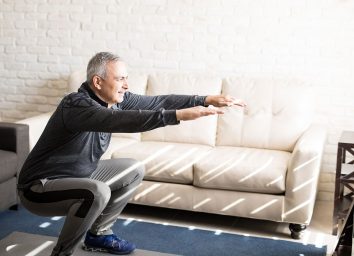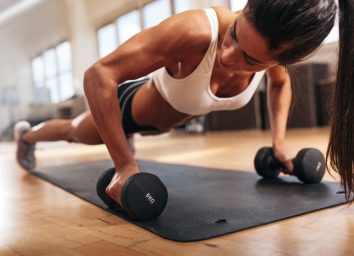The Best Time to Exercise Every Day, According to Your Body

According to Charles A. Czeisler, Ph.D., M.D., a sleep expert at the Brigham and Women's Hospital at Harvard Medical School, "there is a circadian rhythm to athletic performance." Czeisler, who advises professional sports teams on getting better sleep, says that the body's window for peak performance—when focus, strength, flexibility, and reaction time are all greatly enhanced—occurs in the late afternoon or early evening. "This is when the body is sending out its strongest drive for wakefulness," he says. (To underscore his point, he notes that most Olympic records are established when the events are held during the late afternoon or evening hours. "We get that surge of energy right before dusk, and we evolved to have that surge," he explained.)
Well, according to a new study published in the journal Diabetologia, human beings didn't just evolve to break Olympic records late in the day. They evolved to get the most out of their exercise then, as well.
Related: Secret Exercise Tricks for Keeping Your Weight Down for Good.
The purpose of the study, which was conducted by researchers at Australia's Mary MacKillop Institute for Health Research at Australian Catholic University, was to learn how the time of day you exercise can affect your metabolism. The researchers took more than 20 overweight men who lived sedentary lifestyles, and—having checked their aerobic fitness levels as well as other biomarkers—put them on a greasy diet comprise of delivery meals. After eating the unhealthy foods for nearly a week, the participants were then put into one of three groups: those who exercised at 6:30am, those who exercised at 6:30pm, and those who didn't exercise.
"The results were somewhat disturbing," observes The New York Times. "After the first five days of fatty eating, the men's cholesterol had climbed, especially their LDL, the unhealthiest type. Their blood also contained altered levels of certain molecules related to metabolic and cardiovascular problems, with the changes suggesting greater risks for heart disease."
Once they started exercising, however, the early-AM exercisers didn't see a meaningful reduction in their cholesterol levels or any of the other alarming biomarkers. For those who worked out in the evening, it was a totally different story. "The late-day exercisers showed lower cholesterol levels after the five workouts, as well as improved patterns of molecules related to cardiovascular health in their bloodstreams," says The Times. "They also, somewhat surprisingly, developed better blood-sugar control during the nights after their workouts, while they slept, than either of the other groups."
The study authors note that they don't yet know exactly why—given the body's infinitely complex circadian machinery—evening workouts help your metabolism kick into high gear while morning workouts don't.
Now, as all trainers like to say, the best workout you can do is the one you will actually do, so if you're a lark who loves to bound out of bed first thing in the morning, you do you. But if you're looking to offset the effects of poor eating, you'd do worse than scheduling your run for after 6pm.
Whatever you do, however, don't make it too late. "We want to avoid training later in the evening because it stimulates the stress hormone cortisol and can cause you to stay awake later," says Tim Liu, C.S.C.S., ETNT Mind+Body's resident trainer. And if you're in the market for a great workout to try later in the day, don't miss The Secret Exercise Trick for Flatter Abs After 40.








